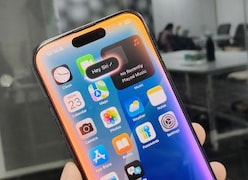- Home
- Mobiles
- Mobiles News
- Apple Must Allow Alternative Browser Engines on iOS by December Under Japan's New Mobile Software Competition Act
Apple Must Allow Alternative Browser Engines on iOS by December Under Japan's New Mobile Software Competition Act
Apple currently only allows browsers that use the WebKit engine to function on iOS, forcing Chrome, Firefox, and others to rely on Safari’s engine.

Photo Credit: Reuters
Apple has been probed by several antitrust regulators in various countries
Apple will have to allow third party browsers to function without relying on its WebKit engine on iOS, under a new law notified by Japan. The new mandate, which comes into effect in December, is the country's attempt to thwart the tech giant's alleged anti-competitive practices. Just like the EU, browsers like Firefox, Microsoft Edge, and Opera will be able to offer access to alternative browser engines, such as Blink and Gecko.
Apple Already Allows Multiple Non-WebKit Browsers on iOS in the EU
According to Japan's Mobile Software Competition Act Guidelines (MSCA), prepared by the Japan Fair Trade Commission (JFTC), Apple's restrictions that only allow browsers to use the WebKit engine is anti-competitive. This, according to the regulator, makes it impossible for other browsers like Google Chrome, Opera, Microsoft Edge, and Firefox to implement their own browser engines.
Google Chrome, Mozilla Firefox, Opera, and other browsers available on iOS are currently forced to use the WebKit engine. On other platforms like Android, browsers like Chrome, Edge, and Opera use the Blink engine, while Firefox uses Gecko.
However, this is not the first time that Apple has been forced to offer browser choices. In 2024, the Cupertino tech giant released the iOS 17.4 update, with which the company allowed third-party browser engines to onboard in the EU, thanks to its Digital Markets Act. However, Apple imposed stringent region-based restrictions that deterred the development of Gecko and other browser engines on iOS.
The same update introduced support for downloading alternative app stores and install apps from outside the App Store in Europe. Android has offered this ability for several years, allowing them to download and install APKs.
Apple users in the EU also received new default app controls as part of the iOS 17.4 update. The tech giant has also been embroiled in several anti-competitive lawsuits in the US, the most recent being the lawsuit that was filed against it by Epic Games, the developer of Fortnite. The US-based tech giant only allowed in-app payments, on which it charged a hefty commission. This practice was ruled as unfair by a US District Court, which directed the company to allow app developers to accept payment from other means.
Get your daily dose of tech news, reviews, and insights, in under 80 characters on Gadgets 360 Turbo. Connect with fellow tech lovers on our Forum. Follow us on X, Facebook, WhatsApp, Threads and Google News for instant updates. Catch all the action on our YouTube channel.
Related Stories
- Samsung Galaxy Unpacked 2025
- ChatGPT
- Redmi Note 14 Pro+
- iPhone 16
- Apple Vision Pro
- Oneplus 12
- OnePlus Nord CE 3 Lite 5G
- iPhone 13
- Xiaomi 14 Pro
- Oppo Find N3
- Tecno Spark Go (2023)
- Realme V30
- Best Phones Under 25000
- Samsung Galaxy S24 Series
- Cryptocurrency
- iQoo 12
- Samsung Galaxy S24 Ultra
- Giottus
- Samsung Galaxy Z Flip 5
- Apple 'Scary Fast'
- Housefull 5
- GoPro Hero 12 Black Review
- Invincible Season 2
- JioGlass
- HD Ready TV
- Laptop Under 50000
- Smartwatch Under 10000
- Latest Mobile Phones
- Compare Phones
- OPPO A6v 5G
- OPPO A6i+ 5G
- Realme 16 5G
- Redmi Turbo 5
- Redmi Turbo 5 Max
- Moto G77
- Moto G67
- Realme P4 Power 5G
- HP HyperX Omen 15
- Acer Chromebook 311 (2026)
- Lenovo Idea Tab Plus
- Realme Pad 3
- HMD Watch P1
- HMD Watch X1
- Haier H5E Series
- Acerpure Nitro Z Series 100-inch QLED TV
- Asus ROG Ally
- Nintendo Switch Lite
- Haier 1.6 Ton 5 Star Inverter Split AC (HSU19G-MZAID5BN-INV)
- Haier 1.6 Ton 5 Star Inverter Split AC (HSU19G-MZAIM5BN-INV)

















